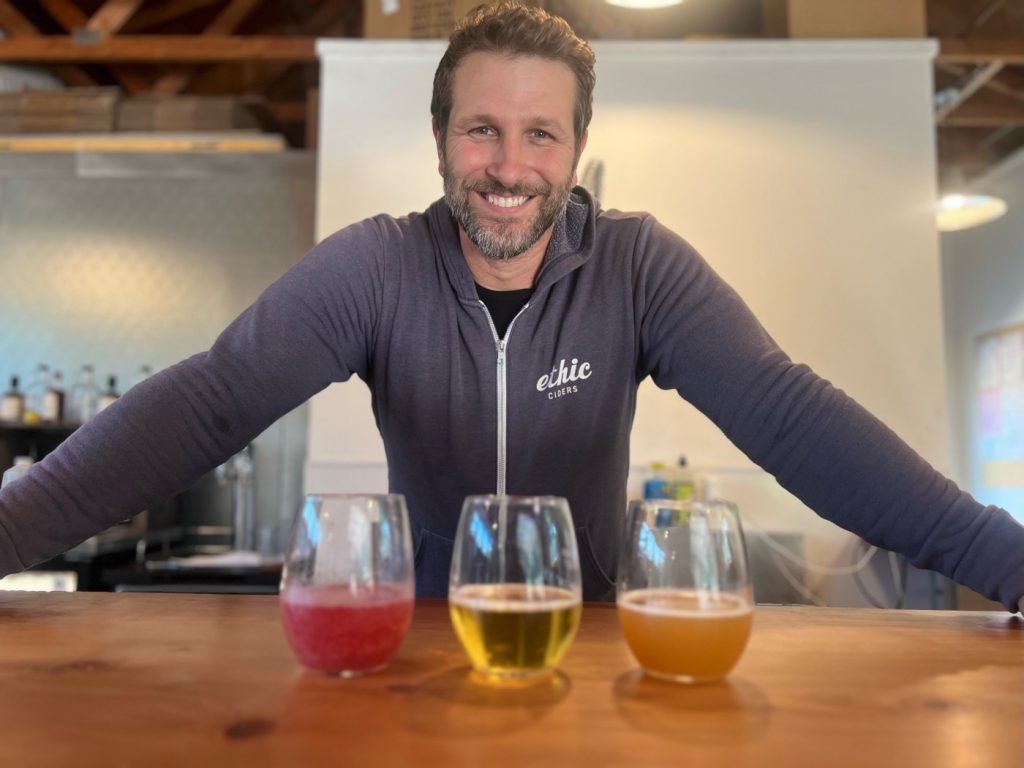Who knew all it takes to make tasty hard cider is a whole lot of nothing? Make that a lot of carefully designed nothing.
Ethic Cider is a cidery located in Sebastopol – a pleasant burg in Sonoma famed for its Gravenstein apples – that practices regenerative agriculture or techniques that improve soil health and climate resilience. The ground is barely tilled and instead carpeted with cover crops. The apple trees are minimally pruned and not watered. The result is an orchard that’s deliberately been overtaken by nature, and one that produces abundant, intensely flavored apples perfect for making cider. (The judges at the Good Food Foundation seem to agree: They’ve given the cidery three Good Food Awards.)
Ethic Cider recently opened its experimental orchard to the public and debuted a new cider barn where you can watch the entire cider production process. There, visitors can attend modern-farming workshops like “The Alchemy of Cider Making” and “Revolutionizing Row Crops.” And there’s a bar where you can sample unique ciders like Montage (made with heirloom apples, crabapples and wild pears and aged in Hungarian oak) and Scarlett (an effervescent Gravenstein blend with local raspberries and blackberries).
Founder Ned Lawton and chief cider maker Dwight Harrington recently chatted about their philosophy of cider making, why they love regenerative agriculture and what they have cooking in the cider realm for 2024.
Q: Tell us about this cider barn you’ve opened.
Lawton: We do everything in the barn. It’s only 1,000 square feet, but we have tanks in there, so you can see the full production. We have a flexible bar where people on the weekends can come in and taste with us. We’ve also built a little area above the barn where you can sit, view the orchard and be outside.
Q: And now visitors can roam through your farm and orchard?
Lawton: That’s the unique experience we offer that a lot of other cideries don’t at the moment. (Visitors) can see how the cider is made — and having a farm experience on top of that makes it a cool experience for people.
Harrington: I love that we’re finally able to offer this to people. Right now, I’m standing outside in the orchard, and it’s beautiful, especially now that we have our cover crop. It’s just a special place to be, and I’m excited for people to join us.
Q: Any fun animals visitors might encounter on the property?
Lawton: We have two dogs, so there’s that. We have chickens. We obviously have a lot of wildlife in general going through the property, because we encourage that for various reasons. If you’re in the orchard, sometimes you can see foxes, possums, all kinds of different animals coming through, and there’s tons of bird life up here.
We’ve put in a number of “positive predatory” boxes on the property, so we have owl boxes, bluebird boxes and bat boxes. We’re encouraging that animal life to come and help us keep the bad bugs down, the ones that get on apples.
Ethic Cider in Sebastopol has a new cider barn and tasting room where you can also learn about modern farming. (Courtesy of Ethic Cider)
Q: What else are you doing related to regenerative agriculture?
Lawton: We took a grant from the NRCS (Natural Resources Conservation Service), which is a division of the U.S. Department of Agriculture, that helped us put in a number of things. One is the no-till, low-till option, so we stopped tilling our orchard and basically replaced that with cover cropping. There’s also a bee colony in a log hive that we built, which is there to provide us with pollination of our trees in the spring. We still prune and take care of the trees, but we do it in a way that’s minimally invasive.
Q: You don’t water the trees, right? Why is that?
Related Articles
Your neighborhood pub is in trouble
California beverage company that caters to women ordered to pay $12.7 million for alleged fraud
3 fun and festive cocktails for Valentine’s Day
11 great winter date ideas for Bay Area adventure, romance and food
3 great cocktail recipes for your Super Bowl LVIII party (plus mocktail options)
Lawton: Dry farming is important because one, we’re not watering like crazy – we never would, because we don’t usually have a lot of water to work with up here. But also, if you put a lot of water on the roots, you’re going to get a watered-down version of the fruit. If you give (the trees) less, you’re starting to build structure in that fruit because it’s having to build a lot more sugars to support itself. We don’t have big apples like you’d see in the grocery. These apples are more hand-sized, but they’re super flavorful.
Q: What kinds of apples are you growing now?
Harrington: The soil’s great up here for apples. About half of our orchard is Golden Delicious – these beautiful trees that are 25 to 30 years old just have some special vibes. The flavors are so concentrated, and we get such good sugars and tannins out of them. One that we use specific to Sonoma County is the Gravenstein apple. Sebastopol is kind of the only place you find them. Then for single-release ciders, we’re doing Wickson, which is a small, red crabapple with really high acidity. We have another called Nehou, which is a small French apple that’s extremely tannic but makes a unique, different cider with a beautiful tannin.
Ethic Cider in Sebastopol has a new cider barn and tasting room where you can also learn about modern farming. (Courtesy of Ethic Cider)
Q: Your specialty is hard cider, of course. Have you considered a zero-proof version?
Lawton: We are building a product that will be out in spring for that market. It’s meant to be more of a healthy, beneficial drink, with no alcohol but a lot of adaptogens, basically things that are considered medicinal or good for your gut or circulation. So things like lemon balm, herbs and things like that.
Q: Can you tell us a little more about the workshops and events you’re holding?
Harrington: Regenerative agriculture is really important to us, and we like to showcase it, so we’re offering some classes and seminars. We want people to see it for themselves, so they can start doing it on their properties.
Lawton: We also do a Locals Night on the first Thursday of the month from 4 to 7 p.m. People can come, and we’ll have food vans, a special cider on tap and probably throw music in there or maybe a trivia night.
Details: Ethic Cider is open for winter hours from noon to 5 p.m. Friday-Sunday and by appointment at 8490 Occidental Road, Sebastopol; ethicciders.com.
Using apple brandy is one way to enhance a cider-based cocktail. (Courtesy of Ethic Cider)
Cider isn’t just for drinking — you can make it into cocktails, too. Here are three favorite recipes from the folks at Ethic Cider, one of which incorporates some of the apple-based spirits they make in Sonoma. Note that Foundation and Golden Rule Ethic Ciders can be used interchangeably.
Stone Fence Cocktail
INGREDIENTS
1.5 ounces Ethic Apple Brandy
1/4 ounce simple syrup or agave
3 dashes aromatic bitters
1 ounce fresh lemon juice
2 ounces Foundation Ethic Cider
Lemon twist, for garnish
DIRECTIONS
In a cocktail shaker filled with ice, combine apple brandy, lemon juice, simple syrup and bitters. Shake vigorously until thoroughly chilled and cloudy. Strain into a rocks glass filled with ice. Top the cocktail with Foundation Ethic Cider. Garnish with a lemon twist.
Mary Margarita Cocktail
INGREDIENTS
1 ounce blanco tequila
1.5 ounces fresh grapefruit juice
1 ounce fresh lime juice
3/4 ounce simple syrup or agave
4 ounces Gravitude Ethic Cider
Rosemary sprig, for garnish
DIRECTIONS
In a cocktail shaker filled with ice, combine tequila, grapefruit juice, lime juice and simple syrup. Shake the ingredients well until thoroughly chilled. Pour the contents of the shaker (including the ice) into a rocks glass. Top the cocktail with Gravitude Ethic Cider. Garnish with a fresh rosemary sprig and add more ice to the glass if desired.
Farmstead Cider’s Lemonade Stand Cocktail
INGREDIENTS
2 ounces vodka
3/4 ounce fresh lemon juice
1/2 ounce honey simple syrup
1⁄4 ounce St.-Germain elderflower liqueur
3 ounces Zest Ethic Cider
DIRECTIONS
In a cocktail shaker, combine lemon juice, vodka, honey simple syrup and St.-Germain. Add ice and shake vigorously until thoroughly chilled and cloudy. Strain the mixture over ice into a collins glass. Top off the cocktail with Zest Ethic Cider and give a gentle stir.
– Recipes courtesy of Ethic Cider
For more food and drink coverage
follow us on Flipboard.


